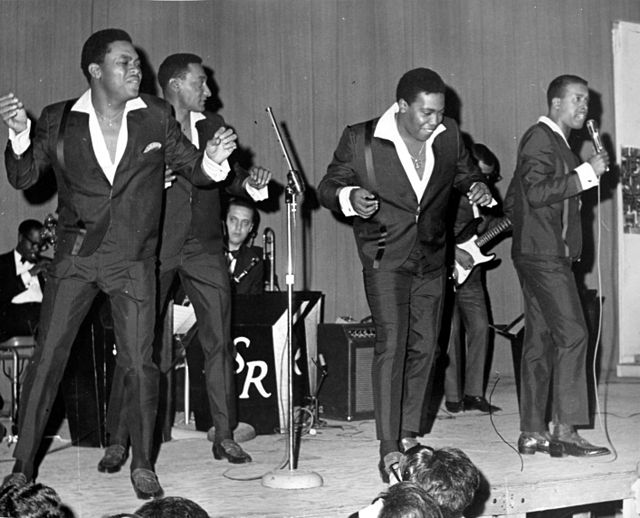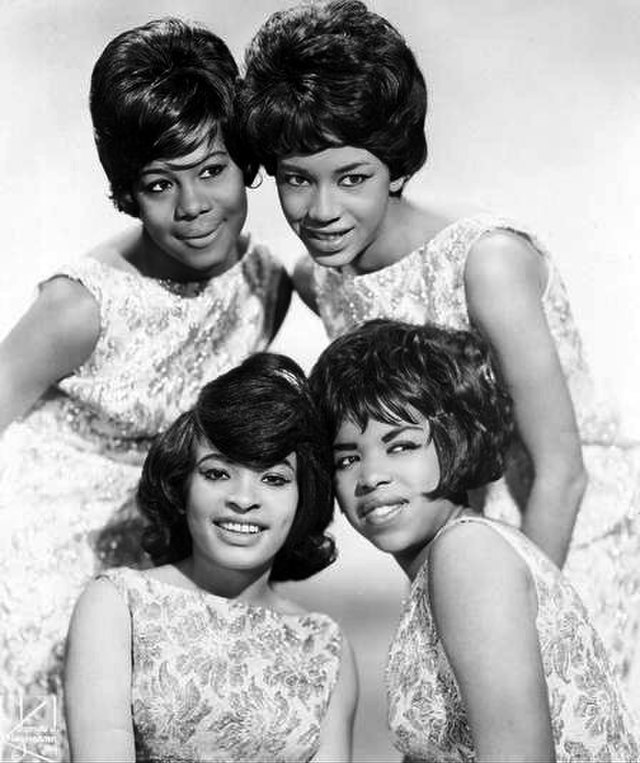
Detroit/Motown Soul 3
The Four Tops' first hit "Baby I Need Your Lovin'" (1964) offers a classic example of the Motown gospel-pop crossover formula, with its soulful vocals, call-and-response, rhythmic vamp, handclaps, and irresistible sing-along chorus. The group went on to achieve fifteen U.S. Top 40 hits between 1964 and 1970.

Four Tops - Baby I Need Your Loving (1966) HQ 0815007 [ 00:00-00:00 ]

The Temptations My Girl HD [ 00:00-00:00 ]
With their 1965 release "My Girl", the Temptations were even more successful, achieving twenty-seven U.S. Top 40 hits between 1962 and 1971. Note the use of strings in this song as an instrumental solo (starting at 01:26) instead of the honking saxophone or trumpet solo used in rhythm and blues and Southern soul. The Temptations' output ranged from gospel-pop classics such as "Ain't Too Proud to Beg" (1966) to the funky rhythmic intensity of later songs such as "Papa Was a Rollin' Stone" (1972).
The Marvelettes, who sang the popular song "Please Mister Postman" (1961), were led by "the guileless, unschooled voice of Gladys Horton" (George 1985, 41) and were Motown's first successful "girl group." However, they soon faced internal competition. Martha and the Vandellas' hit songs (including "Heat Wave" (1963) and "Dancing in the Street" (1964) had an irresistible youthful energy driven by the raw, soulful intensity of Martha Reeves's voice. Regardless of the singer, all these recordings are representative of Detroit soul music.

Supremes - Baby Love 1964 [ 00:00-00:00 ]
Diana Ross provided The Supremes (Motown's most successful female group) with an equally distinctive, yet entirely different, signature lead vocal sound. Ross's voice was the epitome of Motown "cool," and her smooth, silky tone and unhurried phrasing helped turn songs such as "Baby Love" and "Where Did Our Love Go" (both in 1964), "I Hear a Symphony" (1965) and "You Keep Me Hangin' On" (1966) into Motown classics.
As mentioned earlier, Motown's and its Detroit soul music sound-and success-also owed a great deal to the company's talented songwriter producers. At the forefront in the formative years were Smokey Robinson and Holland-Dozier-Holland. Robinson displayed his talents as a lyricist, melodicist, and producer in a series of distinctive, catchy hits including "You've Really Got a Hold on Me" (Miracles 1963), "Mickey's Monkey" (Miracles 1963), "My Guy" (Mary Wells 1964), "The Way You Do the Things You Do" (Temptations 1964), and "My Girl" (Temptations 1965).
A Change is Gonna Come
I was born by the river
In a little tent
Oh, and just like the river, I've been runnin'
Ever since
It's been a long
A long time comin', but I know
A change gon' come
Oh, yes it will
Long Walk to D.C.
It's a long walk to DC but I've got my walking shoes on
I can't take a plane, passer train, because my money ain't that long
America we believe, oh that you love us still
So people I'm gonna be under to wipe away my tears







